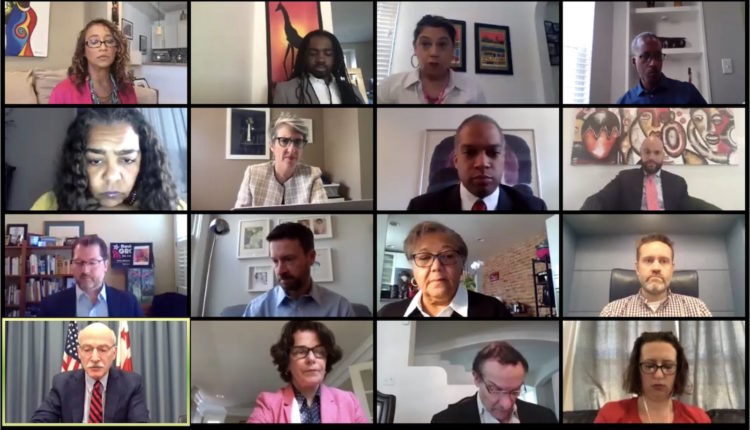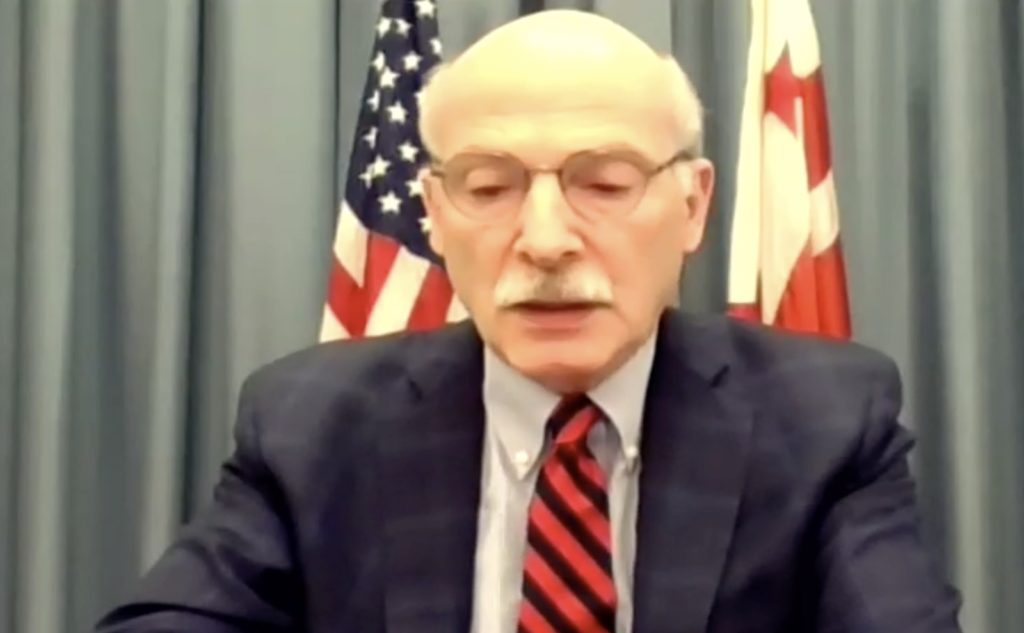
Now in effect, DC’s follow-up COVID-19 relief legislation includes varied consumer protections
As residents continued into week four of social distancing, the DC Council unanimously passed the COVID-19 Response Supplemental Emergency Act of 2020 last week during its first-ever virtual meeting. Mayor Muriel Bowser signed the bill last Friday, putting a diverse set of measures into effect.
“I think we all recognize that our worst days are probably still to come, but this city has shown that we will stick together, that we will rise to the occasion. And I think that this bill speaks to our ability as a city to protect our residents and to be sensitive to both what people are going through and also to make sure that we are setting ourselves up for strong recovery on the tail end,” said at-large Council member Robert White.
Like 10 of his colleagues, White signed into the meeting from home. Only Council Chairman Phil Mendelson was at the Wilson Building.
The bill they approved April 7 prioritizes individual assistance, consumer protections and grant funding to local hospitals. The latter provision authorized Bowser to provide additional funding to address the impacts of the pandemic on hospitals, who can use the funds to pay for additional supplies and equipment, personnel costs, and expenses associated with building temporary hospital structures.

The bill also gave the mayor the ability to extend the public health emergency caused by COVID-19 for another 45 days. After first declaring a public health emergency on March 11, Bowser extended it through April 24 after receiving authority to do so in the DC Council’s first COVID-19 relief bill, approved March 17. On Wednesday, under the new bill, she extended the health emergency though May 15, though she noted she can lengthen it further through June 8 without additional council action.
An initial draft of the bill had included provisions to provide assistance to undocumented immigrants. However, due to the fiscal impact of providing unemployment insurance or individual grant opportunities for this underserved population, no such provisions were included in the bill passed last week.
“We’re committed to continue to work on this issue and see what relief we can provide,” Council Chairman Phil Mendelson said during a press conference the day before the vote. He noted, however, that the District’s resources are limited, with lost revenue causing a projected $607 million gap in the current budget that officials will have to address.
At-large Council member Elissa Silverman, who chairs the Committee on Labor and Workforce Development and had suggested the original provision, said in the chat section of the Zoom call where the meeting was livestreamed that providing the financial assistance to undocumented residents “would cost as much or as little” as the mayor decided. Despite the fiscal analysis that estimated the expense as at least $33 million, Silverman said that the language should have been interpreted as authorizing the mayor to develop a program based on how much funding she could identify.
Silverman also highlighted that the coronavirus has had disproportionate outcomes for communities of color, including immigrant communities.
“These are workers who have made our restaurant industry Michelin-star rated, who have cared for our children and cleaned our hotel rooms, and have literally built this city with the construction industry in the last 20 years,” Silverman said. “They will hardly get any help in this bill because they are excluded from federally funded programs such as unemployment insurance. … This is the time when our DC values of being a sanctuary city, of being a city that cares about racial equity, really needs to come to the forefront.”
A day after the vote, the Bowser administration told legislators in a telephone briefing that officials were working with philanthropic partners to provide financial relief and resources for undocumented workers. Events DC, the District’s convention and sports authority, subsequently approved an $18 million hospitality and tourism relief package that included $5 million set aside for undocumented workers — the figure that advocates had pushed for after questions arose about budget constraints. “I think that the Events DC fund is a huge and impactful investment, especially as a relief bill for the earliest impacted businesses and workers,” Bowser said at a press conference this week.
The council’s bill does expand unemployment benefits to align with the federal CARES Act by including, for example, people such as independent contractors, freelancers and gig workers. At the time of the meeting, DC residents had submitted more than 50,000 claims since March 13, compared to 37,720 in the prior fiscal year, as noted by Ward 8 Council member Trayon White during the discussion; since then, that number has climbed past 66,000. The DC Department of Employment Services projects that its computer system will be ready to process claims from the newly eligible workers by April 28, according to an informational webpage prepared by Silverman’s office.
Additionally, the legislation directs DC-regulated lenders to offer mortgage relief for individuals and businesses, with those receiving the 90-day referral required to reduce the rent for any commercial or residential tenants by a commensurate amount; the council also imposed a rent freeze on all residential units regardless of rent-control status. New consumer protection measures in effect throughout the public health emergency and 60 days afterward include a prohibition on debt collectors initiating, filing or threatening new lawsuits, repossessing a vehicle, or visiting borrowers’ homes.
At-large Council member David Grosso, chair of the Education Committee, said that he was pleased to see that the bill benefits students by waiving the 100-hour community service graduation requirement for current high school seniors. Another provision allows this year’s classes to count toward graduation despite there being fewer in-classroom hours than ordinarily required. “This legislation ensures that our high school students’ futures are not on hold,” Grosso said.
The District still needs to expand access to personal technology devices and internet service, said Trayon White, so that all students can continue their studies at home notwithstanding the digital divide. However, the bill does say that basic cable services and broadband internet service cannot be cut off during the emergency in order to assure residents don’t lose access to important communication; the March bill had set similar prohibitions on disconnections of utilities such as water and electricity.
Other council members shared aspects of the bill that they consider especially important to their constituents, including authorizing compassionate release to help reduce the jail population and allowing older youth to stay in foster care placement if they so choose. Ward 5 Council member Kenyan McDuffie expressed concern, however, that more steps should be taken to provide equitable relief and recovery “using the lens of racial equity” as the District develops further relief programs and economic recovery initiatives. “When we look at history, it demonstrates that communities of color are typically the ones left out, are the ones who find themselves worse off than before they experienced crises like this,” he said. “So I think it’s incredibly important that we focus our resources on the least amongst us.”
As a supplement to the Improving Voter Registration for New Tenants and Homeowners Amendment Act adopted the same day via the consent agenda, the COVID-19 relief bill also says that every registered qualified voter will be sent an absentee ballot application and a postage-paid return envelope for the June 2 primary and June 16 special election as a response to social distancing recommendations during the coronavirus pandemic.
Earlier during the April 7 legislative meeting, council members voted on several other bills, including the Transportation Benefits Equity Amendment Act, which would let employers offer a “Clean Air Transportation Fringe Benefit” for their workers as an alternative to any parking benefits that they offer. Although backers hailed the legislation as creating an incentive for employees not to drive to work, organizations such as the Adams Morgan Business Improvement District urged a delay so businesses would not face potential fines or have to bear the cost of setting up the program at a time when many are struggling to stay afloat. Ward 3 Council member Mary Cheh decried the opposition as “coronavirus opportunism” by those organizations, and she said her committee had already included compromise provisions for business owners. The benefit of a tax-free parking option should flow equitably to residents without cars or who chose not to drive to work, she said, adding that there is no mandate for businesses to provide a parking benefit at all. Although the act received final approval, the mayor and council would need to provide funding in a future budget in order for it to take effect.
As far as the supplemental COVID-19 response bill, Mendelson reminded viewers of the online meeting that the bill was a consensus document developed through consultations among council members, the mayor’s team and Attorney General Karl Racine. He also left open the idea of a third legislative package when the council convenes on April 21 or May 5.
“There are a few provisions in here that I don’t like … so this is not something that is a perfect bill or that everyone of us supports in every way as being the best and complete,” Mendelson said. “But it is a consensus document, and that is important. Our residents want to see the government working together right now, and that is what we’re doing.”


Comments are closed.